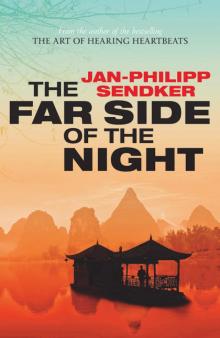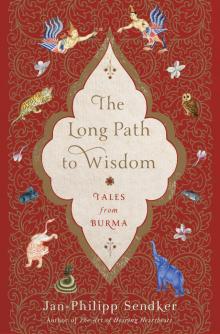- Home
- Jan-Philipp Sendker
The Long Path to Wisdom Page 11
The Long Path to Wisdom Read online
Page 11
The old man smiled knowingly. He had, in fact, met Shin Mi Ya. She had drunk tea with him while she rested for a spell. Then, following a sudden inspiration, she had given the old man one of her rings and asked him to give it to the prince in case he should come looking for her. The old recluse took out the ring and pointed the prince in the right direction.
Shin Mi Ya had found her way back to the land of the nats, where she was warmly welcomed. She must bathe immediately, though, so strongly did she smell of the mortals among whom she had spent so much time. A number of nats were then dispatched to the nearby waterhole, arriving at the very same moment as the prince. He could sense the proximity of his wife, and he made this bold prediction: If it was his fate to find Shin Mi Ya, then the last of the servants would not be able to lift her water jug.
And indeed the vessel proved too heavy for her. The prince immediately offered assistance, and as he did Shin Mi Ya’s ring fell into the water. Moments later, just when she had finished bathing, the ring slipped onto her finger. Seeing this, she sprang up and embraced her father, the king of the nats. Fervently she beseeched him to bring her beloved prince to her.
Of course her father was suspicious and wanted to test the prince. How on earth had he even found the legendary land of the nats? Did he possess magical abilities of his own? The father assembled seven enchanting young nats and lined them up with Shin Mi Ya behind a thick curtain. Each was allowed to extend only a single finger beyond the curtain. By this finger alone the prince would have to recognize his wife.
It was not easy for the prince. In the end a kindly nat whose sympathies privately lay with the young couple came to his aid. In the form of a golden fly he flitted back and forth between the prince and Shin Mi Ya’s finger. After a while the prince decided to trust the curious insect and took hold of the finger on which it sat. The curtain was thrown back and the lovers fell into each other’s arms.
Now Shin Mi Ya’s father was ready to bless their bond. After some time the two returned to the kingdom of Paya. The king had died in the meantime, and the prince and Shin Mi Ya now ruled the land happily and justly.
There was once a farmer so poor he was on the brink of despair. No matter how hard he worked, he was never able to harvest enough to keep from going hungry. Whenever the crop did happen to look a little more promising, when the corn shot up and the potatoes grew strong, a mighty storm would come, or the rivers would overflow their banks and lay waste to his field. When his wife could no longer bear their poverty and left him, he lost all will to live. Determined to die, the farmer set off to look for Death. He walked through the village asking everyone he met if they knew where he might find him.
Thinking he had lost his senses, the villagers shunned the farmer. So he left the village and roamed through the province in hopes that Death was somewhere out there. Finally he reached the coast. The beach was completely empty apart from one old man who stood with both feet in the water gazing out upon the ocean.
“Where are you headed?” the old man called out when he spied the farmer.
“I’m not sure. I’m so poor that I don’t want to live anymore. I’m looking for Death.”
The old man shook his head. “Young man, you don’t know what you are saying.”
The farmer turned away disappointed and set off again without a further question. He had not gone far when he felt a cold hand on his shoulder. “Wait,” he heard a dark voice say. “Where are you going? I am the one you seek.”
The farmer wheeled around in surprise and before him stood the old man.
“You?” he asked skeptically. “Well then! What are you waiting for? I’m at the end of my rope. Please help me and give me what I seek.”
Death looked him up and down thoroughly, and then a wide grin spread across his face. “You can’t die now because your hour has not yet come. When it is time, I will come for you whether you want it or not. Then you can try to escape me, but you will not succeed.”
“Can you at least tell me when the hour of my death will be?”
“One week after you leave the beach you will become a rich man. Ten years later to the day you will die. Here is a bow and some arrows.” Death conjured the weaponry out of thin air and handed it to the farmer. “Use these wisely.”
With these words Death turned and walked away.
“Wait!” the man called, running after him. “I have one more question.” But try as he might, he could not catch him.
And so he was left standing there on the beach dumbfounded. Feeling his stomach begin to growl, he set off to find something to eat. Presently a large bird soared overhead. The farmer had never been a good archer, yet his first arrow brought the bird right out of the sky. To his surprise he saw that the bird he had killed was not a normal bird but was made of solid gold. It was so heavy that he was able to carry it to the next town only with great effort. There he traded it for a large piece of land with the most fertile ground. While he stood on his newly purchased property a second bird flew over him. He nocked an arrow but this time missed his target. Where the arrow buried itself in the dirt a magnificent villa suddenly sprang up with rooms full of silver and gold coins. As the incredulous farmer stepped inside, he discovered the house already full of servants ready to attend to him.
Thus the poor farmer became a very wealthy yet generous man who was loved by the whole village and who lived his life to the fullest. Time passed and the man who once so longed to die now gave no further thought to mortality. His encounter with Death was completely forgotten.
Nine years and nine months had passed when one night he awoke in a cold sweat. The old man from the beach had appeared in his dream. Death’s voice was as loud and clear as if he stood directly before him. The man shivered. Only three months remained before the ten years were up. But he was healthy. He loved his life. He didn’t want to die. Was it possible to escape Death?
The following day he ordered his servants to build him a watertight crate and to fill it with a three-month-and-three-day supply of food and drink. They were to then bring the crate down to the beach.
When he saw the crate, doubt briefly crept into his mind. Did he really want to spend three months in such cramped quarters? It looked anything but comfortable. If this is the price I must pay to escape Death, then I am willing to pay it, the young man thought to himself with a sigh as he climbed into the crate. He instructed his servants to seal the crate, secure a long rope to it, and let it sink to the bottom of a deep part of the ocean. They were to tie the other end of the rope to a palm tree and then pull him back up onto land in exactly three months and three days.
A few weeks later, as Death was checking his list of those whose time had nearly expired, he noticed the name of the young man and immediately remembered their chance encounter on the beach. Curious as to what had happened to the young man, he set off to find him in the living world. Even though he searched high and low, the man was nowhere to be found. He double-checked his list in case he had made some kind of mistake, but no, the man’s name was definitely there. He continued his search, traveling from village to village, checking in every house and every hut, but to no avail.
When the day arrived on which the young man was supposed to die, Death went back to the beach to the very spot where the two had met ten years earlier. He found no trace of him here, either. Completely at a loss and worn-out, Death walked along the beach until he suddenly tripped over a tightly drawn rope and tumbled head over heels into the sand.
What kind of an idiot would leave a rope tied up here? he wondered. He was just about to keep on walking when he was overcome by curiosity and began to pull on the rope. It was rough going. The rope turned out to be longer than anticipated, and whatever was attached to it was heavier than he had expected. Finally a wooden crate surged up from the depths and soon the waves washed it up onto the beach. He inspected the construction in amazement. He knocked on it. Hearing nothing, he opened it, and out stepped
the young man.
“Ah, so here you are then!” Death said angrily. “I’ve run myself ragged looking for you. Did you really think you could escape your fate by hiding in a crate?”
The young man fell to his knees before Death. “Please spare me,” he begged. “I will give you half of my riches if you show me mercy. I don’t want to die!”
Death looked at him sternly. “Didn’t I once explain to you right here on this beach that no one can die before his time has come? Didn’t you listen?”
“Y-yes, I did,” stammered the young man.
“No one can delay his death when the time has come, even if he very much desires to and even if he tries everything in his power. Do you know why not?”
“No.”
“It is because every person has their own karma. It’s the result of everything they have done in their previous existence.”
The young man again began to moan, complain, and beg. Death silenced him with a wave of his hand and then began his work.
In the Irrawaddy delta, amid the brackish waters and the marshes, there lived a boy named Maung Shin. His father was one of the farmers in the delta who understood a thing or two about cultivating crops and breeding cattle, and the family was moderately well-off. Maung Shin was just a boy when his father died quite unexpectedly, and that was the beginning of his family’s misfortunes. Maung Shin’s mother did her best to keep them afloat and to stretch their savings as far as possible, but despite their modest lifestyle, their reserves were soon spent.
Maung Shin’s mother had a sister who lived nearby and who had borrowed money from them before his father’s tragic death. Hoping to improve their dire situation, Maung Shin’s mother went to her sister and asked her to repay what she had borrowed. To her dismay, she got nothing from her sister but derision and insults. Her sister scoffed at her request and claimed to have no money. The poor widow was utterly taken aback, especially since she knew well that her sister led a carefree life, had significant means at her disposal, and would have had no trouble paying off the loan. In the end she resolved to sever ties with the family, to leave her village near Bago, and to try her luck at a fresh start with her son in some other place.
Now, even as a very young child Maung Shin had demonstrated a matchless talent on the arched harp. The tones he coaxed out of the strings were so pure and compelling that they could melt a heart of stone. On top of that he was a gifted singer whose clear voice and noble bearing reflected his honorable spirit. His melodies, drifting on a soft breeze, were inconceivably beautiful. With the family savings spent and with no other reliable sources of income on the horizon, Maung Shin took to playing harp and singing for the inhabitants and pilgrims who happened through his new village. Mother and son lived primarily from the symbolic offerings they received in recognition of the boy’s widely acclaimed abilities.
Maung Shin was profoundly unhappy about this turn of events and about the financial crisis in which the family now found itself. He could hardly bear to watch his mother’s daily struggle to survive, and he felt a burning desire to do more to lighten her burden and to improve the family’s situation. The meager earnings from his music barely sufficed to meet even their most basic needs. Maung Shin came to the conclusion that he must find additional work if he wanted to have any hope of improving his family’s fortunes. Because the lad had few talents beyond playing and singing, however, he needed to find some kind of unskilled work. Eventually he fell in with a band of lumbermen who harvested the yellow sandalwood trees in the region and who were willing to take him into their service. Sandalwood was in high demand both as a building material and for its distinctive essential oil. The loggers were on their way to the thickly wooded and often crocodile-infested islands of the lower Irrawaddy delta.
Given Maung Shin’s limited skills as a woodcutter, however, the lumbermen decided that ship’s cook was a better fit for the boy, who eagerly accepted the position. When he was not in the galley preparing a meal for the crew, he was out in the wilds gathering all sorts of provisions so that he would be able to serve the men a fresh, delicious meal at the end of their long, strenuous workday. While searching for ingredients, he would sometimes pause to sing and play his harp. The residents of the idyllic delta islands found his lovely notes irresistible, but these islands were also home to several treasure goddesses who were soon captivated by Maung Shin’s enchanting tones. It was not long before they made a regular habit of searching out the young man. They would join him on the boat nearly every day so that they could sing and dance while he played.
When the holds were finally full of lumber, the pilot made the boat ready for the homeward journey. But when the boat was pulling away from its berth, the anchor suddenly stuck fast, and no amount of exertion could free it. The pilot and his crew investigated but could find no reason why it would not move. When all possible remedies failed, the crew supposed that one of their number must have committed some reprehensible crime during their stay on the island. Someone must have incurred the wrath of the spirits. When no one confessed, the group decided to draw lots. Every member of the crew must take one of several little rolls of paper, on only one of which was a red dot. The man with the red dot would be considered the guilty party.
When all the lots were drawn and unrolled, who should have the red dot but Maung Shin! The foreman knew that Maung Shin had done no wrong and had spent his days on the island gathering food for the crew and playing music, activities that could hardly have enraged the gods. He concluded that it must be a mistake, and the lots were gathered and shuffled for another round. When Maung Shin drew the red dot a second time, the captain and the crew again gave him the benefit of the doubt, but when Maung Shin drew the red dot a third time, there was no more getting around the fact that he was the cause of their difficulties. To appease the gods the pilot had Maung Shin thrown summarily from the boat into the muddy waters where the crocodiles lay in wait. Maung Shin died a miserable death.
If anyone was suffering pangs of guilt, they did not last long. Sacrificing Maung Shin had apparently satisfied the gods, for the boat was now able to pull away and sail for home without further incident.
The crew did not know that the treasure goddesses had prevented the ship from leaving in order to keep the lovely music on the island. It was they who had seen to it that Maung Shin drew the red dot every time. The treasure goddesses were overjoyed that they had managed to thwart his departure. They gathered his mortal remains from the river floor, and Maung Shin was transformed into a nat, a spirit named U Shin Gyi. To this day people will make a small offering to the young harpist before venturing out on the water, whether river, lake, or open sea. The guiltless lad came to a violent death through no fault of his own, and only through the unjust deeds of the goddesses. It is said that if one listens closely, one can still make out the unearthly tones emanating from the musician’s silken harp strings amid the tumbling surf.
In a certain Burmese village, as in many other parts of the country, there was a market every five days where farmers would come from the surrounding area to peddle their goods. It was always loud and crowded, and the air was filled with the fragrance of spices, meats, and assorted delicacies. Among these farmers was a man of the Palaung tribe. On this day, as usual, he had set up a booth where he was selling, among other things, fresh eggs. The eggs, like the chickens who laid them, came in a range of sizes.
He was doing a lively business, and of course the largest eggs were the first to go. In the end the farmer was left with only the smallest, so one of the later customers started to dicker with him. The farmer admitted that these eggs were smaller than usual and offered the customer a good bargain, but the customer continued to haggle until the farmer eventually offered such a low price that he would hardly profit from the sale.
The customer, who saw things differently, became cross. The farmer said: “I know that these are very small eggs, but I promise you that they are absolutely exquisite. Remember
: I am not the one who laid these eggs. Nor did I ask the chickens to make them so small. If I could lay an egg for you it would be the size of a papaya!”
The customer recognized the farmer’s sincerity and was satisfied. He purchased all of the remaining eggs and the two parted with the deepest mutual respect.
A long time ago the Karen people lived in a single village under the leadership of benevolent elders. The entire community worked, ate, and lived together like one large family. They shared everything they owned.
One harvest season, however, they found themselves in dire straits: A large wild boar kept destroying their fields, and the villagers were unable to kill it. Completely at a loss, they brought the problem before the village elder, who took it upon himself to solve it. I am no longer the youngest, he thought, but I am and remain the leader of this community. He set off into the forest searching for signs of the wild boar. Soon he found its tracks and discovered torn-up areas on the forest floor where the animal must have foraged. At last he found the boar’s den and lay down to wait near its entrance. When he could hear the quiet, even breath of the sleeping animal, he crept nearer and stabbed it to death in its den.
Upon his return, the village elder was greeted joyously. Why, they asked, had he taken on this task single-handed and thereby put himself in so much danger?
The elder only laughed: “I am old, my children. If I die it is but a small loss, don’t you think?”
Out of the tusks of the wild boar, the village’s best craftsman fashioned a magnificent comb, which they used on the elder’s hair in a festive ceremony. But what a surprise awaited the entire village when, before everyone’s eyes, the gray hair that was drawn through the comb turned black and the elder grew younger until he was once again a young man. It appeared that the Karen had discovered the secret of eternal youth.

 The Language of Solitude
The Language of Solitude A Well-Tempered Heart
A Well-Tempered Heart The Art of Hearing Heartbeats
The Art of Hearing Heartbeats The Far Side of the Night
The Far Side of the Night Whispering Shadows
Whispering Shadows Dragon Games
Dragon Games The Long Path to Wisdom
The Long Path to Wisdom